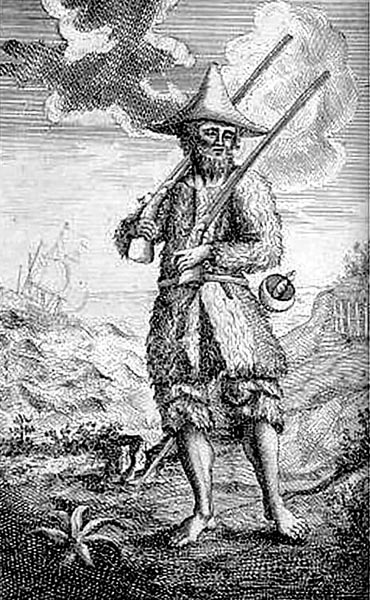 |
| Crusoe from an illustration in the first edition (Wikipedia) |
Note: Meet literature's most famous castaway as he sets up house and learns to live the good life on the "Island of Despair."
Get Ready: What skills do you have that would enable you to live on a desert island? What skills would you need that you don't have?
In Lesson #08-080 I wrote about The Swiss Family Robinson and mentioned that "Robinson" was a reference to "that greatest of all survivor stories... Robinson Crusoe," a novel by Daniel Defoe. Let's meet that castaway today.
Defoe's 1719 novel was first published under the guise of an autobiography, claiming to have been written by Crusoe himself. Such works were popular at the time, but Defoe came clean in subsequent editions.
The story tells of a man stranded on a remote "desert" (meaning "deserted") island in the Caribbean, and of his harrowing encounters with cannibals and other threats. But many readers find the homier aspects of the story more interesting--how Robinson made a life there, and befriended a local.
The first time Crusoe leaves England (against his parents' wishes), his ship is wrecked in a storm; the second, he is taken by pirates. Escaping slavery after two years, he sails to South America, where he buys a plantation.
Years later he sails again, this time to import slaves, but is shipwrecked on what he calls the "Island of Despair." Overcoming that feeling, he begins domestic activities: building a fence around a habitable cave, making a calendar by notching a wooden cross, hunting, planting barley and rice, making pottery, and raising goats. He also becomes religious, with only a Bible for reading material.
From time to time, cannibals visit the island, where they kill and eat their prisoners. One of those prisoners escapes, and Crusoe befriends him, naming him "Friday" for the day of the week they met. He teaches English to Friday, and converts him to Christianity.
More cannibals arrive. Crusoe and Friday kill them and save two prisoners: one is Friday's father, the other a Spaniard. These two make a plan to sail to the mainland and bring back some other Spaniards shipwrecked there; together, they will all build a boat to escape the island.
But before that expedition can return, an English ship in the hands of mutineers arrives, planning to maroon their captain there. Crusoe helps the captain and a handful of loyal sailors retake the ship, and maroon the mutineers in their stead--but first, humanely, teaches them his techniques for survival.
When he returns to England, Crusoe discovers that his father has left him nothing in his will, believing Robinson dead. But his agents in Lisbon are holding the sizable profits from his Brazilian estate. He and Friday set out to Portugal to retrieve, but go overland--wisely deciding to avoid the risks of traveling by sea.
--------Read more: https://en.wikipedia.org/wiki/Robinson_Crusoe
Practice: Match the term to its definition below:
- castaway
- despair
- habitable
- harrowing
- humanely
- maroon
- mutineers
- notching
- plantation
- stranded
- a large farm
- able to be lived in
- isolate in a dangerous position
- disturbing; distressing
- left in a helpless position
- kindly
- hopelessness
- a shipwrecked person
- cutting marks in
- people who rebel against a ship captain
Answers are in the first comment below.
Submitted to the Shenzhen Daily for July 22, 2021


Answers to the Practice: 1. h; 2. g; 3. b; 4. d; 5. f; 6. c; 7. j; 8. i; 9. a; 10. e
ReplyDelete